Jinwen Tang
AURA: A Reinforcement Learning Framework for AI-Driven Adaptive Conversational Surveys
Oct 31, 2025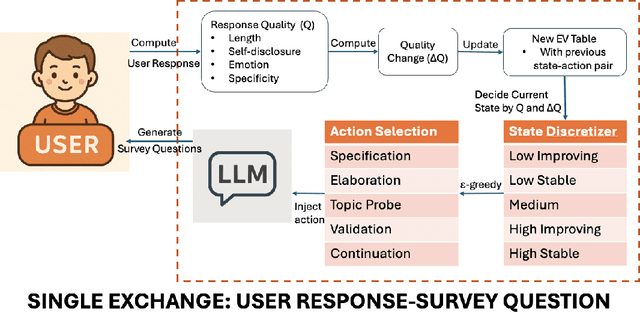



Abstract:Conventional online surveys provide limited personalization, often resulting in low engagement and superficial responses. Although AI survey chatbots improve convenience, most are still reactive: they rely on fixed dialogue trees or static prompt templates and therefore cannot adapt within a session to fit individual users, which leads to generic follow-ups and weak response quality. We address these limitations with AURA (Adaptive Understanding through Reinforcement Learning for Assessment), a reinforcement learning framework for AI-driven adaptive conversational surveys. AURA quantifies response quality using a four-dimensional LSDE metric (Length, Self-disclosure, Emotion, and Specificity) and selects follow-up question types via an epsilon-greedy policy that updates the expected quality gain within each session. Initialized with priors extracted from 96 prior campus-climate conversations (467 total chatbot-user exchanges), the system balances exploration and exploitation across 10-15 dialogue exchanges, dynamically adapting to individual participants in real time. In controlled evaluations, AURA achieved a +0.12 mean gain in response quality and a statistically significant improvement over non-adaptive baselines (p=0.044, d=0.66), driven by a 63% reduction in specification prompts and a 10x increase in validation behavior. These results demonstrate that reinforcement learning can give survey chatbots improved adaptivity, transforming static questionnaires into interactive, self-improving assessment systems.
Attacking LLMs and AI Agents: Advertisement Embedding Attacks Against Large Language Models
Aug 25, 2025Abstract:We introduce Advertisement Embedding Attacks (AEA), a new class of LLM security threats that stealthily inject promotional or malicious content into model outputs and AI agents. AEA operate through two low-cost vectors: (1) hijacking third-party service-distribution platforms to prepend adversarial prompts, and (2) publishing back-doored open-source checkpoints fine-tuned with attacker data. Unlike conventional attacks that degrade accuracy, AEA subvert information integrity, causing models to return covert ads, propaganda, or hate speech while appearing normal. We detail the attack pipeline, map five stakeholder victim groups, and present an initial prompt-based self-inspection defense that mitigates these injections without additional model retraining. Our findings reveal an urgent, under-addressed gap in LLM security and call for coordinated detection, auditing, and policy responses from the AI-safety community.
Decoding Linguistic Nuances in Mental Health Text Classification Using Expressive Narrative Stories
Dec 20, 2024Abstract:Recent advancements in NLP have spurred significant interest in analyzing social media text data for identifying linguistic features indicative of mental health issues. However, the domain of Expressive Narrative Stories (ENS)-deeply personal and emotionally charged narratives that offer rich psychological insights-remains underexplored. This study bridges this gap by utilizing a dataset sourced from Reddit, focusing on ENS from individuals with and without self-declared depression. Our research evaluates the utility of advanced language models, BERT and MentalBERT, against traditional models. We find that traditional models are sensitive to the absence of explicit topic-related words, which could risk their potential to extend applications to ENS that lack clear mental health terminology. Despite MentalBERT is design to better handle psychiatric contexts, it demonstrated a dependency on specific topic words for classification accuracy, raising concerns about its application when explicit mental health terms are sparse (P-value<0.05). In contrast, BERT exhibited minimal sensitivity to the absence of topic words in ENS, suggesting its superior capability to understand deeper linguistic features, making it more effective for real-world applications. Both BERT and MentalBERT excel at recognizing linguistic nuances and maintaining classification accuracy even when narrative order is disrupted. This resilience is statistically significant, with sentence shuffling showing substantial impacts on model performance (P-value<0.05), especially evident in ENS comparisons between individuals with and without mental health declarations. These findings underscore the importance of exploring ENS for deeper insights into mental health-related narratives, advocating for a nuanced approach to mental health text analysis that moves beyond mere keyword detection.
SouLLMate: An Application Enhancing Diverse Mental Health Support with Adaptive LLMs, Prompt Engineering, and RAG Techniques
Oct 17, 2024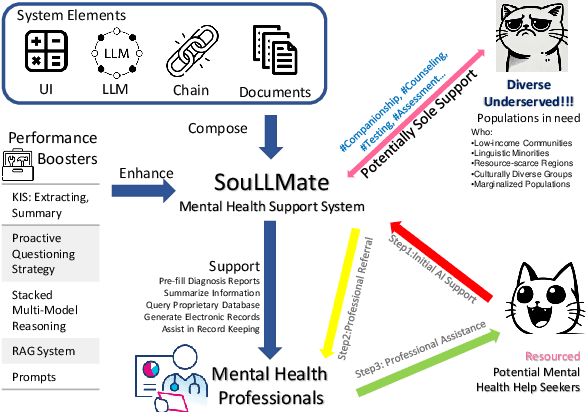
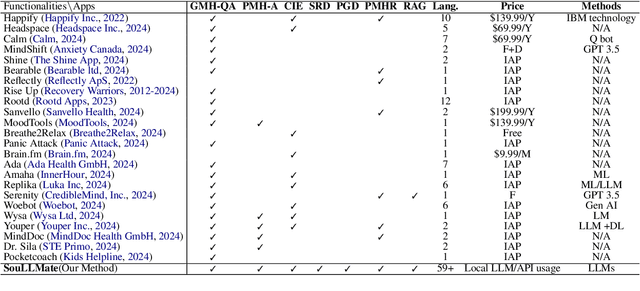
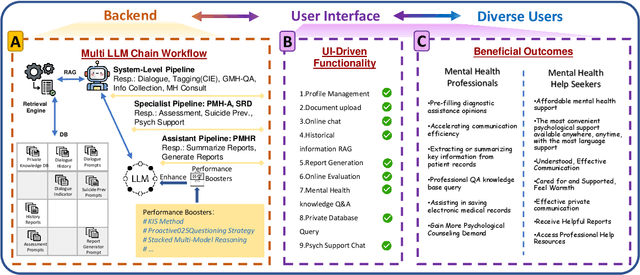
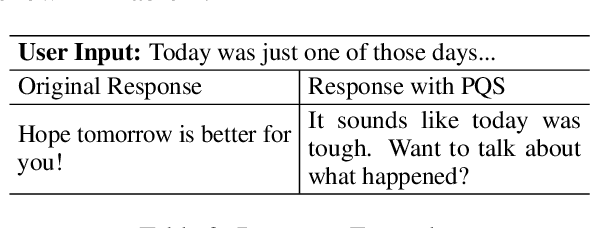
Abstract:Mental health issues significantly impact individuals' daily lives, yet many do not receive the help they need even with available online resources. This study aims to provide diverse, accessible, stigma-free, personalized, and real-time mental health support through cutting-edge AI technologies. It makes the following contributions: (1) Conducting an extensive survey of recent mental health support methods to identify prevalent functionalities and unmet needs. (2) Introducing SouLLMate, an adaptive LLM-driven system that integrates LLM technologies, Chain, Retrieval-Augmented Generation (RAG), prompt engineering, and domain knowledge. This system offers advanced features such as Risk Detection and Proactive Guidance Dialogue, and utilizes RAG for personalized profile uploads and Conversational Information Extraction. (3) Developing novel evaluation approaches for preliminary assessments and risk detection via professionally annotated interview data and real-life suicide tendency data. (4) Proposing the Key Indicator Summarization (KIS), Proactive Questioning Strategy (PQS), and Stacked Multi-Model Reasoning (SMMR) methods to enhance model performance and usability through context-sensitive response adjustments, semantic coherence evaluations, and enhanced accuracy of long-context reasoning in language models. This study contributes to advancing mental health support technologies, potentially improving the accessibility and effectiveness of mental health care globally.
Advancing Mental Health Pre-Screening: A New Custom GPT for Psychological Distress Assessment
Aug 03, 2024Abstract:This study introduces 'Psycho Analyst', a custom GPT model based on OpenAI's GPT-4, optimized for pre-screening mental health disorders. Enhanced with DSM-5, PHQ-8, detailed data descriptions, and extensive training data, the model adeptly decodes nuanced linguistic indicators of mental health disorders. It utilizes a dual-task framework that includes binary classification and a three-stage PHQ-8 score computation involving initial assessment, detailed breakdown, and independent assessment, showcasing refined analytic capabilities. Validation with the DAIC-WOZ dataset reveals F1 and Macro-F1 scores of 0.929 and 0.949, respectively, along with the lowest MAE and RMSE of 2.89 and 3.69 in PHQ-8 scoring. These results highlight the model's precision and transformative potential in enhancing public mental health support, improving accessibility, cost-effectiveness, and serving as a second opinion for professionals.
 Add to Chrome
Add to Chrome Add to Firefox
Add to Firefox Add to Edge
Add to Edge